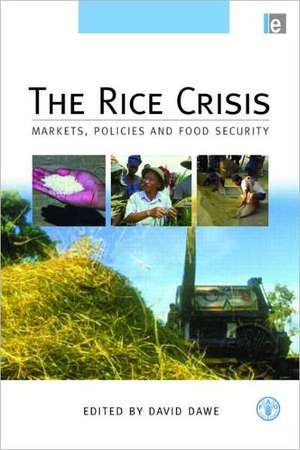The Rice Crisis: Markets, Policies and Food Security
Editat de David Daween Limba Engleză Hardback – 22 sep 2010
This book examines how government policies caused and responded to soaring world prices in the particular case of rice, which is the world's most important source of calories for the poor. Comparable case studies of policy reactions in different countries, principally across Asia, but also including the USA, provide the understanding necessary to evaluate the impact of trade policy on the food security of poor farmers and consumers. They also provide important insights into the concerns of developing countries that are relevant for future international trade negotiations in key agricultural commodities. As a result, more appropriate policies can be put in place to ensure more stable food supplies in the future. Published with the Food and Agriculture (FAO) Organization of the United Nations
Preț: 769.11 lei
Preț vechi: 1105.67 lei
-30% Nou
Puncte Express: 1154
Preț estimativ în valută:
147.22€ • 159.96$ • 123.74£
147.22€ • 159.96$ • 123.74£
Comandă specială
Livrare economică 31 martie-14 aprilie
Doresc să fiu notificat când acest titlu va fi disponibil:
Se trimite...
Preluare comenzi: 021 569.72.76
Specificații
ISBN-13: 9781849711340
ISBN-10: 1849711348
Pagini: 364
Ilustrații: Graphs, index
Dimensiuni: 156 x 234 x 33 mm
Greutate: 0.73 kg
Ediția:1
Editura: Taylor & Francis
Colecția Routledge
Locul publicării:Oxford, United Kingdom
ISBN-10: 1849711348
Pagini: 364
Ilustrații: Graphs, index
Dimensiuni: 156 x 234 x 33 mm
Greutate: 0.73 kg
Ediția:1
Editura: Taylor & Francis
Colecția Routledge
Locul publicării:Oxford, United Kingdom
Cuprins
Part I: Introduction1. Food Crises Past, Present (and Future?): Will we ever learn?Part II: Overview: The World Rice Market and Trade Policies2. The World Rice Market Crisis of 2007-08 3. Did Speculation Affect World Rice Prices? 4. Trade Related Policies to Ensure Food (Rice) Security in AsiaPart III: Policy Responses in Traditional Importing Countries5. Volatility in Rice Prices and Policy Responses in Bangladesh6. Indonesia's Rice Policy And Price Stabilization Program: Managing Domestic Prices During The 2008 Crisis 7. The Rice Crisis in the Philippines: Why Did it Occur and What Are its Policy Implications?8. West African Experience with the World Rice Crisis 2007-20089. Rice in Africa: Will Imports Continue to Grow?Part IV: Policy Responses in Traditional Exporting Countries10. The Political Economy of Thailand's Rice Price and Export Policies in 2007-0811. The Vietnamese Rice Industry During the Global Food Crisis12. Rice Production in Cambodia: Will Exports Continue to Grow?Part V: Policy responses in China and India13. How China Stabilized Grain Prices During the Global Price Crisis14. Rice Policies in India in the Context of the Global Rice Price SpikePart VI: Policy Responses in the Developed Countries15. Japan's Rice Policy and its Role in the World Rice Market: Japan Should Act as a Watchdog16. The 'Diplomatic Crop or How the U.S. Provided Critical Leadership In Ending the Rice CrisisPart VII: Conclusion17. Can the Next Rice Crisis be Prevented?
Notă biografică
David Dawe is a Senior Economist at the Food and Agriculture Organization (FAO) of the United Nations. A graduate of Harvard University, he has studied the Asian rice economy for more than 20 years, including 15 years resident in the Philippines, Indonesia and Thailand.
Recenzii
'This book, with chapters from many prominent experts, presents new evidence from the recent rice price crisis and draws lessons for preventing the next crisis. It is a unique set of references on global food security and the world rice market.'Shenggen Fan, Director General, International Food Policy Research Institute (IFPRI)'This book is a must-read for those who wish to understand the world rice market, trade policies and food security concerns. It provides a careful and detailed analysis of the causes and consequences of the 2007 and 2008 global rice crisis. It is written by knowledgeable experts from the key rice economy nations.'Professor Eric J. Wailes, University of Arkansas, USA
